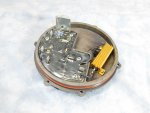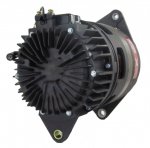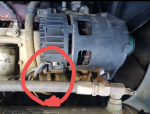-
Steel Soldiers now has a few new forums, read more about it at: New Munitions Forums!
Generator overcharging
- Thread starter cmalueg4
- Start date

More options
Who Replied?Scrounger
Active member
- 496
- 69
- 28
- Location
- Southern, Maryland
The engine has an alternator. If and or when the regulator fails, it can cause the symptoms described. When the alternator is overcharging the batteries, the electrolyte will boil, and the smell is the sulfuric acid boiling away. That isn’t good. The regulator is mounted on the back of the alternator and is readily available from many online sources.
The belt squeal happens when the alternator starts charging. It could mean the belt tensioner is getting weak or the belt is getting worn. Check the belt for wear and replace if worn. If the belt squeals when the fan comes on, then plan on replacing the belt tensioner.
The belt squeal happens when the alternator starts charging. It could mean the belt tensioner is getting weak or the belt is getting worn. Check the belt for wear and replace if worn. If the belt squeals when the fan comes on, then plan on replacing the belt tensioner.
Last edited:
I just bought this truck so haven't load tested batteries, there is 4 interstates in it but don't know the age. N yes, when truck starts it over charges for a bit, then it charges fine, then randomly over charges, so I'm assuming it is the regulator, will have to try and track one down, thanks
So is the red circled thing what needs replacing?
Attachments
-
697.1 KB Views: 34
Scrounger
Active member
- 496
- 69
- 28
- Location
- Southern, Maryland
If you have to replace the regulator the easiest way is on the bench. Remove the wires and cable from the unit, paying attention to how they are installed. Remove the six screws that hold the regulator on the back of the alternator. Use a punch, drift, or chisel and a hammer to tap off the regulator.
To reinstall. The metal where the six screws that hold regulator on sometimes becomes displaced along the inside where the O-ring seals. If it has it can be difficult to get the regulator to seat. A Dremel or straight die grinder makes quick work of the displaced metal. Lube the O-ring with silicone, tap the regulator in place, reinstall the screws. Then install it in the truck.
There is a plug on the side of the regulator. When it is removed it allows a screwdriver to adjust the voltage. Allow the engine to run for a few minutes to warm up the alternator before making any adjustments. It is better to use a multi-meter than to trust the dash gauge for adjustments. After connecting the multi-meter and with the engine running, turn the screw till you see around 28.6 volts. Reinstall the plug and cable cover and your done.

To reinstall. The metal where the six screws that hold regulator on sometimes becomes displaced along the inside where the O-ring seals. If it has it can be difficult to get the regulator to seat. A Dremel or straight die grinder makes quick work of the displaced metal. Lube the O-ring with silicone, tap the regulator in place, reinstall the screws. Then install it in the truck.
There is a plug on the side of the regulator. When it is removed it allows a screwdriver to adjust the voltage. Allow the engine to run for a few minutes to warm up the alternator before making any adjustments. It is better to use a multi-meter than to trust the dash gauge for adjustments. After connecting the multi-meter and with the engine running, turn the screw till you see around 28.6 volts. Reinstall the plug and cable cover and your done.

davidb56
Well-known member
- 1,020
- 1,238
- 113
- Location
- Bonners Ferry Idaho
Hydrogen sulfide.....but sometimes its the dog farting.Great information, just ordered one, only place I found that offers just the regulator was eastern surplus so that's where I got it. Be happy to not smell those batteries.
tpiekbp
Member
- 32
- 36
- 18
- Location
- Artesia, NM
I just got my M934a2 last night after 8 months waiting on my EUC. Even though it was 10 degrees out it fired right up. The truck was warming up and voltage was good until all of a sudden it shot up and in seconds burst one of the batteries. I shut it down and am wondering if that sounds like everyone else’s voltage regulator issues? Scrounger, is your instruction for a regulator on a 5 ton?
Scrounger
Active member
- 496
- 69
- 28
- Location
- Southern, Maryland
The M939 series trucks use the alternator as pictured. The aforementioned instructions apply to that type of alternator, whatever the vehicle.
There could be several reasons for a battery to come apart. If the electrolyte in one or more cells is low, the battery can short out. That can create a spark that can then ignite the hydrogen gas. That is one of the reasons to charge batteries in a well ventilated area.
I would pull the batteries from the truck; they will have to be removed to clean things anyway. Then check the electrolyte on the “good” batteries. That may give you an idea of what failed. If the batteries are only a year or two old I would fully charge them. Then load test them. If the batteries are old or miss matched I would just replace them. After installing a good set of matched batteries I would start the truck and monitor the voltage. If it doesn’t steady up after a couple of minutes, replace the regulator. If the alternator is overcharging, it won’t hurt the batteries if it is only for a few minutes.

There could be several reasons for a battery to come apart. If the electrolyte in one or more cells is low, the battery can short out. That can create a spark that can then ignite the hydrogen gas. That is one of the reasons to charge batteries in a well ventilated area.
I would pull the batteries from the truck; they will have to be removed to clean things anyway. Then check the electrolyte on the “good” batteries. That may give you an idea of what failed. If the batteries are only a year or two old I would fully charge them. Then load test them. If the batteries are old or miss matched I would just replace them. After installing a good set of matched batteries I would start the truck and monitor the voltage. If it doesn’t steady up after a couple of minutes, replace the regulator. If the alternator is overcharging, it won’t hurt the batteries if it is only for a few minutes.

tpiekbp
Member
- 32
- 36
- 18
- Location
- Artesia, NM
Thank you for the quick response Scrounger. They are brand new batteries and were right in the green on the trucks voltage gauge after startup. In the time it took me to hop down and walk around the truck, and climb back in, the voltage pinned to the high side of the gauge and within a few seconds of that, one battery popped a side open and the other blew the filling caps off.
I’ve always ran a pair of 12 volt deep cycle batteries in my other 5 tons in the same configuration I am running for this truck. It had been sitting a long time since I bought the truck, and it was about 10 degrees out so I’m hoping I can blame it on the regulator although it seemed pretty quick to fry the batteries. I know they weren’t frozen, they came out of a heated shop.
Has anyone started and ran their truck with the alternator wires disconnected? I just need to get the truck a couple miles from where it was off loaded to my house.
I’ve always ran a pair of 12 volt deep cycle batteries in my other 5 tons in the same configuration I am running for this truck. It had been sitting a long time since I bought the truck, and it was about 10 degrees out so I’m hoping I can blame it on the regulator although it seemed pretty quick to fry the batteries. I know they weren’t frozen, they came out of a heated shop.
Has anyone started and ran their truck with the alternator wires disconnected? I just need to get the truck a couple miles from where it was off loaded to my house.
74M35A2
Well-known member
- 4,142
- 341
- 83
- Location
- Livonia, MI
Overcharging even momentarily can cause lots of damage, especially to these trucks that have no protection for such. It can near instantly damage the CTIS module, ABS module, and PCB internals, as these electronics do not have over-voltage protection in them as well. It can also damage batteries as observed. I had an alternator regulator stick on full tilt on a car while I ran in to get a pizza and the B+ battery cable insulation burst into flames.
The alternator circuitry design of these trucks are in the top 2 design flaws of the M939xx series, along with the transfer case low range breakage. The connectivity method used is nearly 100 years old from 1900's telephone technology, idle cooling airflow stinks, the regulator is weak, the pulley to shaft keyway interface is weak, and most importantly, there is no fail-safe if the external voltage reference lead loses battery voltage signal, which is what typically drives these units to over-charge. Any modern alternator would have a 28.8v limit built into it if the external reference voltage is lost, as to not over-charge. This is the exact situation that happens when the vehicle is shut down in the "incorrect" switch order. So very stupid. Sure you can be disciplined and follow the TM exactly, but what happens somebody else needs to shut your truck down, or etc....? The alternator design is decades older than the truck design.
They can and do work, and they are by far the coolest looking alternator for the vehicle, but just too much risk to other system parts in keeping them in my opinion. Get a modern one, paint it flat black, and never have to look at your volt gauge again, plus then shut your truck off in any switch order without worry. Even the $100 24v Chinese Delco clone alternators are way further ahead in design durability. Good connectivity, keyless pulley, fail-safe external reference circuitry, decent cooling, etc......
If you like your alternator, you can keep your alternator, but here is yet another failure of one.
If you disconnect the alternator to run the engine, be sure to disconnect all the wires attached to it, not just the large or small ones.
The alternator circuitry design of these trucks are in the top 2 design flaws of the M939xx series, along with the transfer case low range breakage. The connectivity method used is nearly 100 years old from 1900's telephone technology, idle cooling airflow stinks, the regulator is weak, the pulley to shaft keyway interface is weak, and most importantly, there is no fail-safe if the external voltage reference lead loses battery voltage signal, which is what typically drives these units to over-charge. Any modern alternator would have a 28.8v limit built into it if the external reference voltage is lost, as to not over-charge. This is the exact situation that happens when the vehicle is shut down in the "incorrect" switch order. So very stupid. Sure you can be disciplined and follow the TM exactly, but what happens somebody else needs to shut your truck down, or etc....? The alternator design is decades older than the truck design.
They can and do work, and they are by far the coolest looking alternator for the vehicle, but just too much risk to other system parts in keeping them in my opinion. Get a modern one, paint it flat black, and never have to look at your volt gauge again, plus then shut your truck off in any switch order without worry. Even the $100 24v Chinese Delco clone alternators are way further ahead in design durability. Good connectivity, keyless pulley, fail-safe external reference circuitry, decent cooling, etc......
If you like your alternator, you can keep your alternator, but here is yet another failure of one.
If you disconnect the alternator to run the engine, be sure to disconnect all the wires attached to it, not just the large or small ones.
tpiekbp
Member
- 32
- 36
- 18
- Location
- Artesia, NM
You make an excellent point! I hadn’t thought about just finding a modern replacement of the GI alternator. It would make sense that the technology has evolved considerably even since ‘86 when my truck was built or ‘03 when it was gone over, one can only imagine with even older trucks. Thanks 74M35A2
- 114,336members
- 167,221threads
- 2,354,115posts
- 3,689online users

